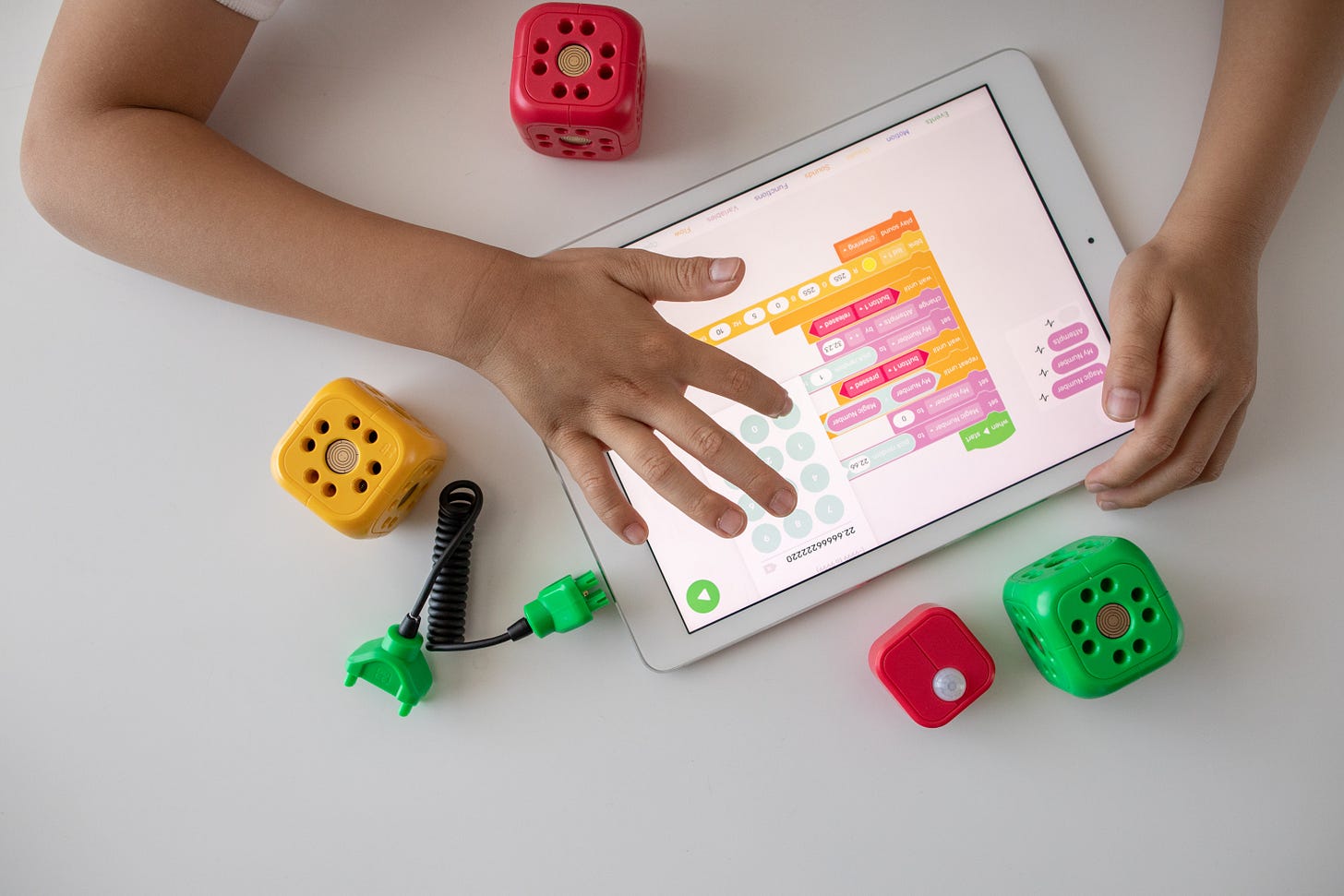Indoctrination by Fisher Price
There's something amiss with Fisher Price's 'My Home Office' play set. This piece breaks down what makes the play set different from other sets, why it's detrimental, and proposes alternatives.
Better grab a latte to go, that report is due this morning and there’s a call with the dog across the street after naptime. With the Fisher-Price® My Home Office set, your preschooler is the boss of their own workstation at home, the local coffee shop, or the moon. This 8-piece pretend play set includes a pretend laptop, 4 fabric apps to attach to the computer screen, a wood smartphone and headset for all those important business calls, and a to-go cup for kids to sip their favorite beverage. Urgent call from the cat: the busy business requires immediate attention.
I read this product copy and am awash in dread. The stress of producing a report just two people will see envelops me like cold molasses. I pee my pants and demand a fruit snack. I am four and I am playing with the Fisher-Price My Home Office play set.
This one’s different
This isn’t the first play set to mimic an adult job--think construction sets, doctor kits, and kitchen sets--but it’s the first to unambiguously mimic managerial, administrative white collar work. The distinction between the first set of jobs and the one portrayed above is that former have tangible outcomes easily understood by a child. There’s also the satisfaction that comes with them: A construction worker uses a saw to cut wood in half, the doctor makes someone’s stomach ache go away, and the chef bakes treats. Even for many adults, on a day-to-day basis, it’s difficult to comprehend how a day’s worth of powerpoint slides and a slate of conference calls moves anyone any closer to a tangible goal.
A doctor uses the play stethoscope to listen to a heart, the construction worker a play hammer to put a nail in a board, the chef puts dough in the oven and out comes a cake. The use of the tool is immediately followed with a result. Contrast that with a headset and graph. The play headset goes on, the play app goes on the computer screen and then…nine months later operational inefficiencies are reduced by 30%?
There’s an intermediation in managerial and administrative office work that doesn’t exist in most professions aped by other children’s play sets. You do a thing on your computer, then a bunch of other people do some things on their computers, then a milestone is reached that nobody can touch or see.
Here’s why it’s a bad idea
If there’s no immediately discernible result, where’s the excitement for the kid? Likely, it comes from getting to pretend to be like their parents. Is it fun? Well, just 34% of employees are ‘engaged’ at their job and 53% are ‘not engaged’. Plus, the parents spend on average, 58 minutes total coming and going to work. If most parents aren’t engaged with it, and spend an inordinate amount of time getting to it, where’s the fun in that?
Without the fun or the tangible nature of the work, it’s hard to look at this play set set as anything besides a brightly colored, fatal-if-swallowed, early indoctrination into work culture.
Rather than make play sets that try to make work fun, parents—and all of us—would be better off if kids had a more realistic expectation of what work is and what it’s for. One study reveals that a major contributing factor to millennials’ low engagement at work--71% aren’t engaged--is because of the high expectations passed onto them of what work is supposed to be.
Work, as it pertains to the support of one’s livelihood, should not be framed as something someone does to fulfill a dream or passion. Let’s tell children what adulthood will probably look like. Let’s explain to children not just what a job is, but all the ancillary requirements there are to participate: commuting, taxes, coworking, being sedentary, wearing clothes you don’t like, power dynamics which don’t exist anywhere else in your life, at-will employment, post-work happy hours, powerpoint, etc. Dreams and expectations should be mutually exclusive.
Expectations of a future unmet play a role in clinical depression. This isn’t to say every child is set up for depression, but given that, it’s fair to say setting expectations a job should and could be one’s passion sets kids up for disappointment.
Some better ideas
Instead of giving kids a play set that encourages middle management emulation and lunchtime salad salivation, I have some better ideas for play sets. Each whimsically teaches different sets of life skills:
Iguana rancher: Wind at their backs, dirt under their nails, and iguanas just waiting to be corralled, your kids will have a rootin’ tootin’ time with this play set. It comes with four life size plush iguanas, one iguana rancher hat (like a cowboy hat but made of purple patent leather), a 3ft. x 4ft. iguana pen, 1 light-up iguana lasso, and an iguana trough for when it’s iguana feedin’ time. Nothing instills responsibility in a child like having a mess of iguanas to raise into adulthood and sell at next year’s reptilian stock show.
Rollerblade technician: Nobody likes a busted ‘blade. Fix your friends’ rollerblades so they can get back home before afternoon snack time. This set comes with a blade toolbox complete with a 6-piece toolset: wrench, hammer, pliers, drill, staple gun, and shovel. Light-up blowtorch requires 2 AA batteries to operate. Kids will learn the importance of a hyper-specialized skill that will in no way ever become obsolete, rendering them virtually unemployable for a job with commensurate pay, midway through their lives.
Moonwater harvester: Spirits may be down when young Sally’s working a water farm on the moon, but the lack of gravity will pick her right back up. Water is essential to life and what’s more essential than being the person that essentially supplies all that essential substance? Play set comes with a fully interlocking water harvester suit: 1 pair of adjustable anti-gravity boots, 1 breathing helmet that attaches to the oxygen tank, and one red space suit to wear over it all. Set also comes with a moon pickaxe and transponder for when your little harvester is feeling lonely in space.
Read this also:
MidRange is an experimental new project by longtime newsletter author Ernie Smith, best known for the twice-weekly history newsletter Tedium. Three times a week (Monday, Tuesday, and Thursday), Ernie writes about whatever’s on his mind—tech, pop culture, creativity, or general weirdness—in 30 minutes or less. It’s an easy, fun read first thing in the morning. Subscribe here.
🧸🪀🚂 Want to play with me every week, once a week? Subscribe:
💼📊🖇 Put yourself to work, forward this to a friend, or share it on social media:








So good.
Laughed out loud till my heart broke at the myths we feed ourselves and our children. Excellent piece on the welfare of our workforce.